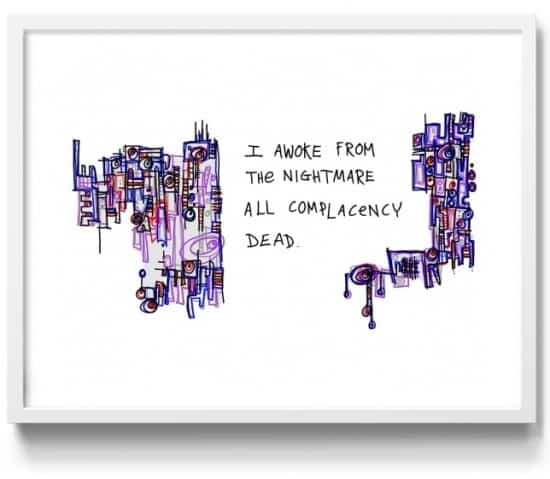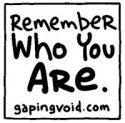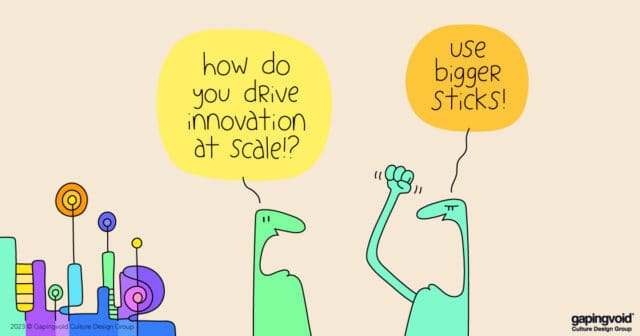
[“Nightmare”, which I sent out in the newsletter recently. You can buy the print here etc.]
[Today’s guest blog post comes from Pat Kane.]
“No ‘occupation’ or ‘vocation’ or ‘craft’ or ‘sector’ is ever going to be stable and predictable ever again.”
The first phrase that came into my head considering the title ‘remember who you are’ is the Marianne Williamson line: “Your playing small doesn’t serve the world”. Indeed not.
The second one came from John Calvin, via Theodore Roszak.
“If God had formed us of the stuff of the sun or the stars”, wrote Calvin, “or if he had created any other celestial matter out of which man could have been made, then we might have said that our beginning was honourable. But we are all made of mud, and this mud is not just on the hem of our gown, or on the sole of our boots, or in our shoes. We are full of it, we are nothing but mud and filth both inside and outside.” But as Roszak says, cosmology tells us we are indeed formed of “the stuff of the sun and the stars”. So to refute the old moan, our existence is thus intrinsically honourable.
Remembering who I am, at this stage in the game, is about remembering the conceptual, artistic and emotional breakthroughs I’ve made in my life as musician, writer and lover (of change, people, and everything in between). And these breakthroughs have essentially been about recognising that illimitabiity – so foul to Calvin, so joyous to the cosmologists – at the heart of the human condition.
When I was a wee child, it was about the infinite possibilities of Lego, comix, fevered dreaming. When I was a young man, it was the endless variations involved in creating a new piece of music, or the excitement when a great thinker blasted my existence into a new context, penetrated to the heart of the obvious and made it new and strange.
As a father, it was realising that a daughter who seemed to be set to repeat her parents’ choices (media/culture) decided to answer her own call and do something completely different (eco-engineering at MIT) – the beautiful though obdurate fact that you bring them up to be autonomous, and you shouldn’t be surprised when they exercise their autonomy.
 And as an adult maker, it’s being struck by the vertiginous realisation – in the age of nano, bio and cogno, the Kurzweilian trinity – that no ‘occupation’ or ‘vocation’ or ‘craft’ or ‘sector’ is ever going to be stable and predictable ever again. And right here, right now, it’s understanding that the playfulness you began your human state with is the playfulness that will keep you adaptive and resilient, as you move through an age of endemic transformation and crisis.
And as an adult maker, it’s being struck by the vertiginous realisation – in the age of nano, bio and cogno, the Kurzweilian trinity – that no ‘occupation’ or ‘vocation’ or ‘craft’ or ‘sector’ is ever going to be stable and predictable ever again. And right here, right now, it’s understanding that the playfulness you began your human state with is the playfulness that will keep you adaptive and resilient, as you move through an age of endemic transformation and crisis.
But there is real profoundity and paradox in the play scholarship – which I obsessively sift through at http://www.theplayethic.com. From biology, ethology and psychology, it is that we play best when we stand on a ground of play: when we are some distance from hunger, when we have a surplus of materials we can play with, when there are distant guarantors of our security while at play. To be clear about this: play doesn’t pull you up by your own creative bootstraps; play needs some security to truly flourish.
And I think that understanding is a real challenge to those in the creative industries and sectors who might too easily fall into Darwinist fallacies like “out of competitive chaos, new order reigns”. Our playful illimitability, in short, depends on limits – the prior necessities of care, health and strength that we would be foolish not to attend to. (As a father, nurturing my girls into full self-possession, how could I ignore the relations between care and play?)
The fashionable term now is ‘neoteny’ – that extension of juvenile characteristics into maturity that defines us as humans. But that flexibility and openness that makes us creative and response-able is also a vulnerabilty and a fragility. At the very least we need to think about a social safety trampoline, never mind a safety-net, if we are going to commit to the high-wire act of a performative, creative life.
For example, might not an American people collectively freed from the fear of falling into ill-health generate even more innovation in products and services? Might they not have some emotional and psychic headroom to lift their heads above the grind, and see real entrepreneurial possibilities in an everyday life which seems amenable to their purpose, rather than treacherous and dangerous?
So remembering who I am, right now in 2010, is about remembering my own affiliations to a tradition of collective progress (call it socialism, if you wish, and I leave Obama out of that one), and trying to reconcile that with the fissible, morphing, transformative networked society we live in right now. How do I make a buck out of that? Not easy. But when you stand face to face with your personal truth, nothing is.
[Besides being a Glasgow-based “musician, writer, consultant, play theorist, activist” and the author of “The Play Ethic”, Pat Kane was lead singer of one of my favorite bands, when I was a kid growing up in Edinburgh.]
[The “Remember Who You Are” archive is here.]



